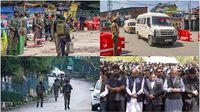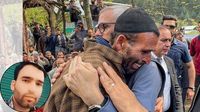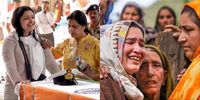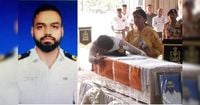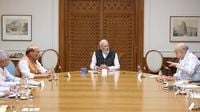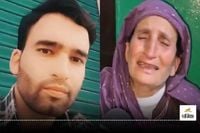In a tragic turn of events, a terror attack in Pahalgam, Jammu and Kashmir, on April 22, 2025, claimed the lives of 28 people, including tourists and locals, sending shockwaves across the nation. Among the victims were newlyweds, families, and a local ponywalla who bravely confronted the assailants to save a woman caught in the chaos.
Syed Adil Hussain Shah, a 28-year-old pony rider, was one of the first casualties of the attack. According to his brother Naushad, Adil was attempting to help a woman whose father had just been killed when he confronted the terrorists. "He had an argument with the killers, questioning what they gained by killing innocents. They opened fire on him as they fled," Naushad recounted, his voice heavy with grief. Adil was shot in the chest and neck, dying on the spot.
Adil's family, who lived modestly in Hapatnad village, described him as the sole provider for his family. He worked as a daily wage laborer, earning around Rs 300 for each tourist ride in the picturesque Baisaran Valley. "He was our only support," cried his mother, as the family mourned their loss. Adil had married just two years ago and was the eldest of six siblings, leaving behind a young wife and children.
Another victim of the attack was Indian Navy Lieutenant Vinay Narwal, who had just returned from his honeymoon with his wife, Himanshi. The couple had tied the knot on April 16, 2025, and were enjoying a vacation in Pahalgam when tragedy struck. "We will be proud of him every day... he has the best life wherever he is," Himanshi said, struggling to hold back tears as she paid her last respects.
The Pahalgam attack has been described as one of the deadliest in the region since the Pulwama bombing in 2019, with Prime Minister Narendra Modi cutting short his official visit to Saudi Arabia to address the situation back home. Upon returning to India, he convened a high-level meeting with National Security Advisor Ajit Doval and other top officials to strategize the government's response.
In the aftermath of the attack, which has been claimed by a faction of the militant group Lashkar-e-Taiba, security has been heightened across the region. Eyewitnesses reported that the gunmen specifically targeted men, demanding they identify their religion and recite Islamic verses. Those who failed to comply were shot on the spot, leading to a chilling realization of the attack's intent.
Among the deceased were also families from various states, including Manjunath Rao, a Bengaluru-based realtor, who was killed while celebrating his son's academic success. His wife, Pallavi, recalled the horrifying moment when gunfire erupted, leaving her husband lifeless beside her.
Prasant Kumar Satpathy, a 43-year-old from Balasore, Odisha, was also among the victims, gunned down while on vacation with his wife and nine-year-old son. His wife recounted how he had saved them during the chaos, a testament to his bravery.
In a heart-wrenching account, Shubham Dwivedi, a 31-year-old businessman from Kanpur, was shot in front of his wife, Aishanya, just two months after their wedding. "They asked me who he was. When I said, 'My husband,' they shot him in front of me," she recalled, her voice breaking.
The attack has left families shattered and communities in mourning, with calls for justice echoing throughout the country. Prime Minister Modi described the attack as a "heinous act" and vowed that those responsible would be brought to justice.
The Jammu and Kashmir government announced an ex-gratia payment of Rs 10 lakh for the families of the deceased and Rs 2 lakh for those seriously injured. As the nation mourns, the families of the victims are left grappling with their loss, seeking answers and accountability for the senseless violence that has marred their lives.
In the wake of the tragedy, anti-Pakistan protests erupted in various parts of the country, with citizens demanding stronger action against terrorism. Home Minister Amit Shah visited the site of the attack, pledging to bring the perpetrators to justice. Meanwhile, an all-party meeting has been convened to address the situation, reflecting the urgency and seriousness of the matter.
The Pahalgam attack not only highlights the ongoing conflict in the region but also raises questions about the safety of civilians, especially in tourist hotspots. As the families of the victims prepare to lay their loved ones to rest, the nation stands united in grief, mourning the loss of innocent lives.
As the investigation unfolds, the government faces pressure to take decisive action against terrorism, ensuring that such tragedies do not repeat in the future. The Pahalgam attack serves as a stark reminder of the fragility of peace in the region and the urgent need for a comprehensive approach to security and community safety.
